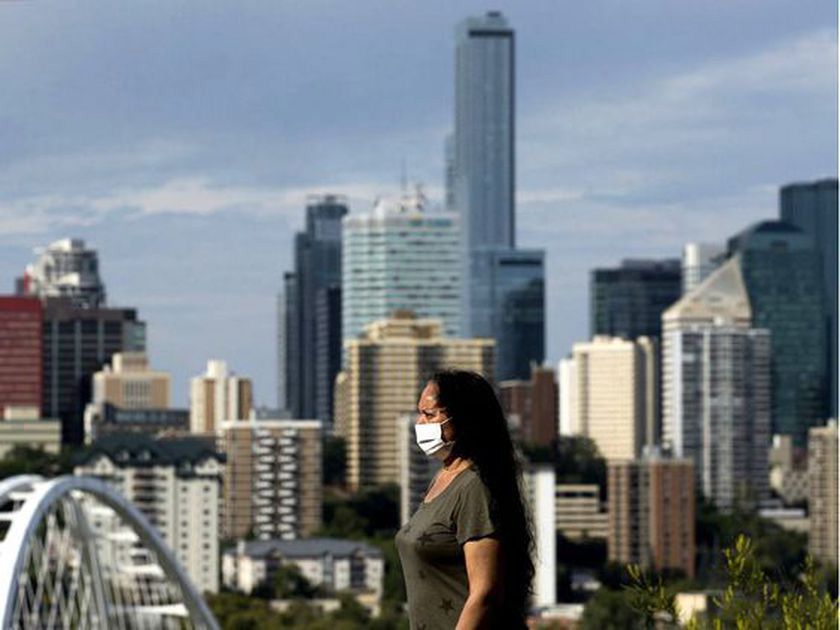Alberta’s chief officer of health Dr. Deena Hinshaw announced on Monday, October 5 that the province is looking at additional measures to curb the spread of COVID-19, as Edmonton’s active cases rise to 894. 126 new cases were identified in Edmonton over the weekend.
Hinshaw noted the large number of new cases is concerning. There has been an escalation of cases in the city and the reproductive rate of the virus has increased to 1.3.
“We are taking this seriously and looking closely at what causes are driving this increase that we are seeing,” Hinshaw said.
“Through conversation with local public health and the city, we are determining if additional measures should be recommended in the city to bring transmission down.”
As of Tuesday, October 6, Fort Saskatchewan has four active cases of the coronavirus and Sturgeon County has 6 active cases. Strathcona County cases reached 27, pushing the mandatory mask bylaw into place.
In August, Strathcona County Council approved a temporary mandatory face-covering bylaw for indoor public places and public vehicles when Alberta Health Services reports 25 or more active cases in the municipality.
“We’ve done very well dealing with COVID-19, this is just one more safeguard that kicks in now,” Strathcona County Mayor Rod Frank said in a video posted to social media.
While no specific measures have been settled on provincially, Hinshaw said health officials will be looking at the surge in cases over the weekend. She emphasized the new cases seen now are a reflection of transmission events that happened one to two weeks ago.
“We should expect, no matter what changes we may or may not choose to make in the coming days to weeks, we will … likely see high numbers of cases over the next one to two weeks which is a product of past transmission.
“We’re looking at those transmission patterns to help us understand what would be most effective and if there are other changes that we need to make to our framework to prevent Edmonton from continuing to have increasing numbers of new cases.”
The city of Edmonton remains on the provincial watchlist and currently has 87.5 active cases per 100,000 people.
An “alarming trend” that has been identified through a review of active cases is that 11 per cent are attending work or going to social gatherings while symptomatic and awaiting test results, Hinshaw said.
“This is a significant risk and is one of the factors causing our case numbers to rise,” Hinshaw said.
Hinshaw is urging Albertans to stay home if they are sick, including this upcoming Thanksgiving weekend. Gatherings should be kept as small as possible and limited to household and cohort numbers.
“If you are even slightly sick, don’t go to a Thanksgiving event and don’t host one at your home. The greatest tragedy would be to have Thanksgiving dinner turn into an opportunity for COVID to spread to our loved ones, potentially with severe consequences.”
The province recorded 97 new cases on Friday, 263 new cases on Saturday and 218 new cases on Sunday.
There are currently 62 people in hospital and of those, 14 are in the intensive care unit.
Eight more people have died of COVID-19, bringing the total to 280. The deaths include a man in his 80s and a woman in her 70s from the Edmonton Zone not in continuing care. Two other deaths of a man in his 90s and a woman in her 70s are linked to the Extendicare Eaux Claire outbreak in Edmonton.
The deaths of a woman in her 90s and a woman in her 60s are linked to an outbreak at Millwoods Shepherd’s Care Centre in Edmonton.
In Canada, there have been 168,960 confirmed cases of COVID-19 and 9,504 deaths, the latest numbers from Health Canada show. Globally, there have been 35,109,317 confirmed cases and 1,035,341 deaths, the World Health Organization reports.
As the coronavirus pandemic continues to play out, the Health Quality Council of Alberta (HQCA) released findings from its first comprehensive survey, with a goal of understanding the experiences of Albertans during COVID-19.
“We’re learning a lot about what Albertans are experiencing with respect to healthcare services, and their own health and wellness, as a result of the pandemic,” says Charlene McBrien Morrison, acting CEO of the HQCA.
“We are also conducting additional, more targeted surveys of families and residents of continuing care sites across the province, and seniors living in lodge settings. As Alberta prepares for a potential second wave of COVID-19 cases, it’s important these valuable insights help inform the ongoing response to this pandemic.”
Thousands of Albertans provided feedback in the HQCA’s public survey from May and June 2020. The survey revealed that while two-thirds (65%) reported feeling protected from COVID-19 infection, the pandemic affected the health and wellness of many Albertans.
Nearly three-quarters (72%) reported experiencing stress, anxiety, or depression during the pandemic, which they found difficult to cope with.
Top challenges identified include maintaining relationships (50%), difficulty sleeping (48%), inability to exercise as normal (48%) and loneliness (46%).
30% delayed seeking healthcare during the pandemic. Of those, over one in five (22%) said delaying their healthcare affected their health greatly or quite a bit.
Information about COVID-19was frequently sought by Albertans (73% checking for news at least once a day), and they relied heavily on Dr. Deena Hinshaw as their most trusted source of information.
Three-quarters (74%) said the advice received in their virtual healthcare visit was helpful, while nearly two-thirds (62%) are receptive to continuing to receive virtual care going forward.
Full survey results are available at hqca.ca/covid-19results.
The HQCA has requested Albertans participate in its COVID-19 Experiences and Impact Survey again to assess changes in their experiences since June and to provide insights on additional topics such as school re-opening measures, mask use, and comfort levels related to a potential future vaccine.
The survey is once again open to all Albertans over the age of 16, and available from albertacovidsurvey.com.

























